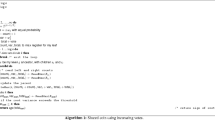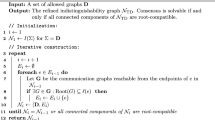Abstract
TheDistributed Consensus problem involvesn processors each of which holds an initial binary value. At mostt processors may be faulty and ignore any protocol (even behaving maliciously), yet it is required that the nonfaulty processors eventually agree on a value that was initially held by one of them. We measure the quality of a consensus protocol using the following parameters; total number of processorsn, number of rounds of message exchanger, and maximal message sizem. The known lower bounds are respectively 3t + 1,t + 1, and 1.
While no known protocol is optimal in all these three aspects simultaneously,Cloture Votes—the protocol presented in this paper—takes further steps in this direction, by making consensus possible withn = 4t + 1,r = t + 1, and polynomial message size.
Cloture is a parliamentary procedure (also known as “parliamentary guillotine”) which makes it possible to curtail unnecessary long debates. In our protocol the unanimous will of the correct processors (akin to parliamentarian supermajority) may curtail the debate. This is facilitated by having the processors open in each round a new process (debate), which either ends quickly, with the conclusion “continue” or “terminate with the default value,” or lasts through many rounds. Importantly, in the latter case the messages being sent are short.
Similar content being viewed by others
References
A. Bar-Noy and D. Dolev, Families of Consensus Algorithms,Proc. 3rd Aegean Workshop on Computing, pp. 380–390, June/July 1988.
A. Bar-Noy, D. Dolev, C. Dwork, and H. R. Strong, Shifting Gears: Changing Algorithms on the Fly To Expedite Byzantine Agreement,Proc. 6th Annual ACM Symp. on Principles of Distributed Computing, pp. 42–51, August 1987.
P. Berman and J. A. Gray, Asymptotically Optimal Distributed Consensus,Proc. 16th International Colloquium on Automata, Languages and Programming, pp. 80–94, LNCS, Vol. 372, July 1989.
P. Berman and J. A. Garay, Efficient Distributed Consensus withn = (3 + ɛ)t Processors,Proc. 5th International Workshop on Distributed Algorithms, pp. 129–142, LNCS 579, October 1991.
P. Berman, J. A. Garay, and K. J. Perry, Towards Optimal Distributed Consensus,Proc. 30th IEEE Symp. on Foundations of Computer Science, pp. 410–415, October/November 1989.
J. Burns and N. Lynch, The Byzantine Firing Squad Problem,Advances in Computing Research, Vol. 4 (1987), pp. 147–161.
B. Coan, A Communication-Efficient Canonical Form for Fault-Tolerant Distributed Protocols,Proc. 5th Annual ACM Symp. on Principles of Distributed Computing, pp. 63–72, August 1986.
B. Coan, Efficient Agreement Using Fault Diagnosis,Proc. 26th Allerton Conf. on Communication, Control and Computing, pp. 663–672, 1988.
B. Coan and J. Welch, Modular Construction of Nearly Optimal Byzantine Agreement Protocols,Proc. 9th Annual ACM Symp. on Principles of Distributed Computing, pp. 295–306, August 1989.
B. Coan and J. Welch, Modular Construction of an Efficient 1-Bit Byzantine Agreement Protocol,Mathematical Systems Theory, this issue, pp. 131–154.
D. Dolev, R. Reischuk, and H. R. Strong, Early Stopping in Byzantine Agreement,Journal of the ACM, Vol. 37, No. 4 (1990), pp. 720–741.
D. Dolev and H. R. Strong, Polynomial Algorithms for Multiple Processor Agreement,Proc. 14th Annual ACM Symp. on Theory of Computing, pp. 401–407, May 1982.
P. Feldman and S. Micali, An Optimal Probabilistic Algorithm for Byzantine Agreement (invited paper),Proc. 16th International Colloquium on Automata, Languages and Programming, LNCS, Vol. 372, pp. 341–378, July 1989.
M. J. Fischer and N. Lynch, A Lower Bound for the Time to Assure Interactive Consistency,Information Processing Letters, Vol. 14, No. 4 (1982), pp. 183–186.
J. Halpern and Y. Moses, Knowledge and Common Knowledge in a Distributed Environment,Journal of the ACM, Vol. 37, No. 3 (1990), pp. 549–587.
L. Lamport, R. E. Shostak, and M. Pease, The Byzantine Generals Problem,ACM Transactions on Programming Languages and Systems, Vol. 4, No. 3 (1982), pp. 382–401.
Y. Moses and O. Waarts, Coordinated Traversal: (t + 1)-Round Byzantine Agreement in Polynomial Time,Proc. 29th IEEE Symp. on Foundations of Computer Science, pp. 246–255, October 1988.
M. Pease, R. Shostak, and L. Lamport, Reaching Agreement in the Presence of Faults,Journal of the ACM, Vol. 27, No. 2 (1980), pp. 228–234.
S. Toueg, K. J. Perry, and T. K. Srikanth, Fast Distributed Agreement,SIAM Journal on Computing, Vol. 16, No. 3 (1987), pp. 445–458.
Author information
Authors and Affiliations
Additional information
A preliminary version appeared as a part of “Towards Optimal Distributed Consensus” inProc. 30th IEEE Symp. on Foundations of Computer Science [BGP], and is part of J. A. Garay's Ph.D. dissertation. This work was partially supported by AFOSR Contract 87-0400 and NSF Grant CR 8805978. The work of Juan Garay was also partially supported by the Leo S. Rowe Pan American Fund of the Organization of American States.
Rights and permissions
About this article
Cite this article
Berman, P., Garay, J.A. Cloture Votes:n/4-resilient Distributed Consensus int + 1 rounds. Math. Systems Theory 26, 3–19 (1993). https://doi.org/10.1007/BF01187072
Received:
Revised:
Published:
Issue Date:
DOI: https://doi.org/10.1007/BF01187072




